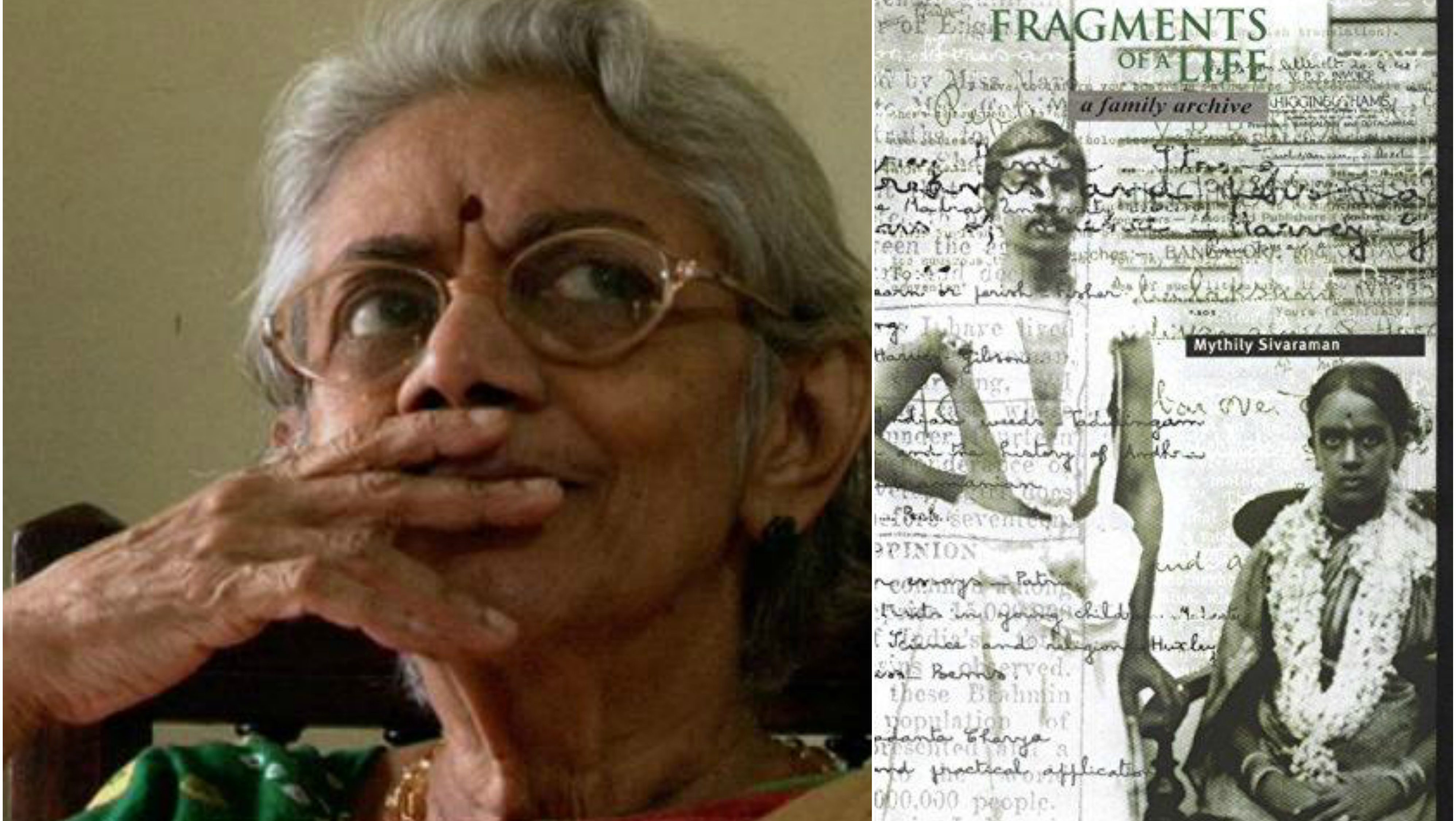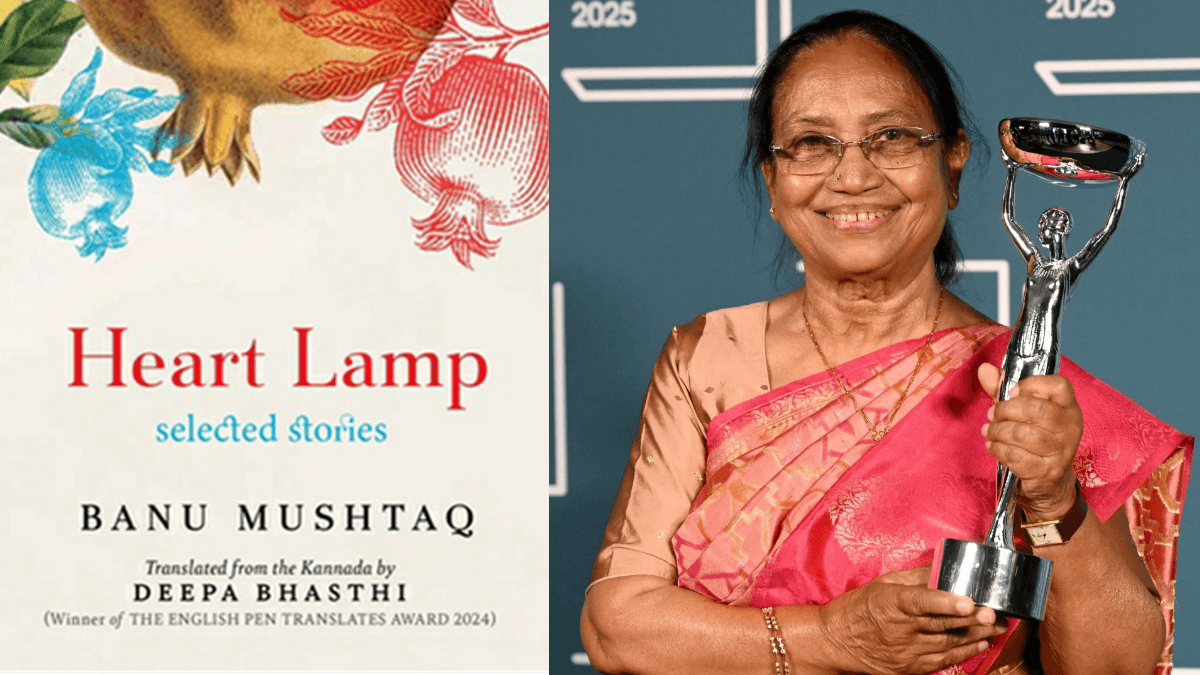History has always been tricky, and additionally ‘his’story conveniently misses the faceless struggles that the millions of ordinary endure. The recorded freedom struggle of India is one such topic where the radical actions of many has been erased by the romanticised heroics of few. Additionally, these few who dominate the discourse are men, and we conveniently omit the rebellions of ordinary individuals who had kept up the momentum for the Indian freedom struggle.
Fragments of a Life (2004)
Author: Mythili Sivaraman
Publisher: Zubaan
Genre: Fiction
Fragments of a Life by Mythili Sivaraman, sheds light on Subbalakshmi, a 11-year old, child bride, mother at 14, from the Madras Presidency. It follows the tumultuous path of the author’s grandmother spanning decades from pre-independence 1897, to her demise in 1978, aged 81.
The life of her grandmother, Subbalakshmi, her marital incongruence, her idealistic outlook—all trapped in the patriarchal value system of the brahmin community—is handled with ease and candour. This frank, outspoken text goes even to examine the nuances of oppression through the caste lens, something which is absent in the narration about the eclectic Subbalakshmi’s life. Though, the double “privilege” of caste and class buffers her, societal judgements dictate the life of Subbalakshmi. Ahead of her times, with a yearning of learning, the travails of her life describe the distance between debates around women empowerment and actuality.
Ahead of her times, with a yearning of learning, the travails of her life describe the distance between debates around women empowerment and actuality.
Pre-independent India was a fertile ground for revolutionary ideas. Among them, the empowerment of women was shaped by many discussions and debates, since many women were active in getting their voices heard. The issue with child-brides, education for girls, and many others were featured in various public debates. As caste angle was inherent in these debates, many in the orthodox brahmin community shunned the proposed changes.
Also read: Book Review: Widows Of Vidarbha – Making Of Shadows By Kota Neelima
The dissonance between patriarchal notion on how a woman must behave, engulfs the life of the literate Subbalakshmi. The expectations of the time, defined that a mere child of 14-year-old had to bear the responsibilities that entail motherhood. This pervasive acceptance in the name of religion, by educated individuals of the community, bears the hypocrisy behind the “alleged piety.”
Married to PR Gopalakrishnan (PRG), a religious, government employed groom, they began their life together (after Subbalakshmi attained puberty) in 1910, at his parent’s house. Following this, the couple moved to separate households as PRG’s job demanded postings in different places along the coastline. The shy, bookworm Subbalakshmi’s conjugal bonds with PRG seem fragile to fulfill societal obligations. The strains of managing a household, the aloofness in their personal relationship—all took a toll on Subbalakshmi’s health. Following this, the demise of her sons add to her emotional scars, but a zealous need to educate her daughter Pankajam, ignites a radical decision to leave the lonely bungalows, for Madras.
The life of Subbalakshmi is narrated along generations preceding and following her (her mother Kamakshi and daughter Pankajam, namely). This fixation with her daughter, Pankajam’s education is the result of her own unfulfilled chances at a formal education. Subbalakshmi’s father, wanting to educate his daughter, was a radical idea in 1897, Travancore. However, Subbalakshmi’s mother Kamakshi’s untimely widowhood snatched this chance from her.
Determined to fuel her passion for learning, Subbalakshmi remained an avid reader and Madras provided a healthy stimulus for her political leanings. Male narratives, ideals populate history and the contrasts of Gandhi and Tagore, the poetry of Bharati, art by Nandalal Bose, paintings by Asit Kumar Haldar—all forge the thoughts and politics of Subbalakshmi.
Fragments of a Life recognises the inherent privilege that comes with certain castes and classes while dissecting the patriarchal notions of the family.
Subbalakshmi, like million others, inspired by the sea-side speeches, turned to khadi as her choice as well. She fashioned simplicity, and shared it with her young daughter, Pankajam. The friendships (Grace Samuel, Kamaladevi Chattopadhyaya) forged by Subbalakshmi added value to her otherwise somber life. However, the missed chance for a life in Shaniniketan shattered her fragile sensibilities.
Fragments of a Life recognises the inherent privilege that comes with certain castes and classes while dissecting the patriarchal notions of the family. Mythili Sivaraman inserts statistics that explain social and gender inequalities of Madras Presidency under colonial rule. She goes on to speculate, the passions of her “unconventional” grandmother and her encounters with caste oppression. The life of Subbalakshmi has been pieced from scant personal writings, and personal accounts from her daughter and grand-children. In the final chapter, the historian, Uma Chakravarti, encapsulates the history of Subbalakshmi’s life with a feminist perspective. Her documentary “A Quiet little Entry“, depicts the life of Subbalakshmi.
Subbalakshmi’s life gives a glimpse of the everyday between 1897 to 1978. It shows how the political debates and social mores affected changes in the lives of millions like her. The story of Subbalakshmi is a small grain on the sands of history. The lives of many like her who defied cultural taboos helped in empowering the women in India. There is a need to call upon such historical accounts from other sections of the society.
Also read: Book Review: Work Like A Woman: A Manifesto For Change By Mary Portas
About the author(s)
A homemaker trying to wedge feminism into daily life. Ambica enjoys reading and is a news junkie. She loves political satire, especially by female comedians. Her other interests are films and plays.




